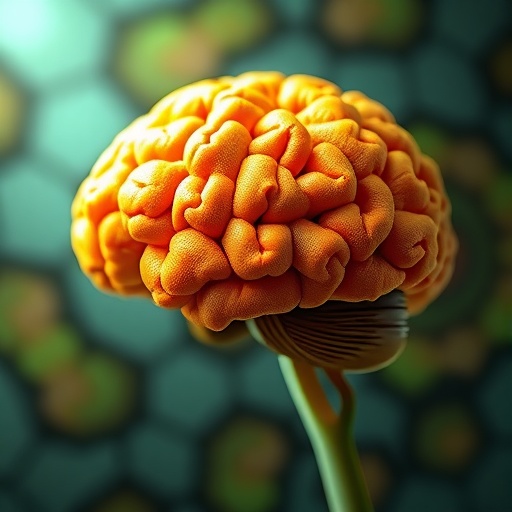In a groundbreaking study published in Nature, researchers have uncovered an intricate layer of translational regulation influenced by polyamine levels, dramatically reshaping our understanding of ribosomal decoding at the codon level. This study highlights how combined metabolic interventions, specifically a ProArg-free diet coupled with DFMO therapy, induce selective ribosomal stalling at unprecedented codon resolution, revealing nuances in protein synthesis regulation that transcend traditional amino acid-centric models.
The investigation dives deep into ribosome profiling data, unveiling a striking discovery regarding polyproline tract translation. Contrary to expectations, ribosomal pausing induced by the combined ProArg-free diet and DFMO treatment was not uniform across all proline codons. Remarkably, stalling was confined predominantly to the CCA codon, with minimal or nonexistent stalling observed in other synonymous proline codons such as CCC, CCG, or CCT. This finding suggests that translational control operates at the nucleotide sequence level of codons, rather than solely at the amino acid level, offering a fresh perspective on the dimensionality of translational regulation.
Expanding the analysis beyond polyproline sequences to include isolated proline codons confirmed the preferential stalling at the CCA codon, reinforcing the notion of codon-specific effects driven by polyamine availability. This specificity contrasts sharply with outcomes stemming from eIF5A hypusination genetic modulation, which uniformly influenced ribosomal pausing across all proline codons while maintaining normal polyamine levels. Such divergent translational profiles emphasize distinct molecular pathways through which polyamines and hypusination modulate protein synthesis.
Notably, in vitro translation assays supplemented with polyamines in neuroblastoma cell lysates further substantiated these findings. The assays demonstrated that polyamine presence preferentially enhances the translation of CCA proline codons over CCG, underscoring a mechanistic role of polyamines in modulating decoding efficiency at particular codons. This codon-selective facilitation suggests that polyamine levels intricately influence the structural or kinetic properties of decoding complexes, shaping ribosomal progression in a codon-dependent manner.
The exploration extended to global codon translation dynamics, where ribosome occupancy was meticulously mapped across all codons. A compelling pattern emerged: codons terminating with adenosine at the wobble, or third nucleotide position exhibited pronounced ribosomal pausing under ProArg-free diet plus DFMO treatment. In sharp contrast, codons with guanosine at this position showed reduced ribosomal occupancy, indicative of faster decoding. These results unveil a codon-specific regulatory mechanism whereby polyamine depletion selectively destabilizes the interaction landscape of certain codons, complicating their efficient decoding by the ribosome.
This codon-specific stalling pattern was partially recapitulated in the DFMO monotherapy group but with attenuated magnitude, signaling a polyamine-centric rather than an amino acid or canonical metabolic deficiency-driven process. Intriguingly, neither genetic nor pharmacological inhibition of hypusination mimicked the codon-level translation impediments observed, reinforcing the hypothesis that polyamine depletion independently orchestrates discrete translational reprogramming patterns.
Molecular analyses indicate that disrupted codon–anticodon interactions underlie much of the observed translational pausing. Codons exhibiting the strongest stalling frequently correspond to tRNAs bearing complex biochemical modifications at the wobble base (position 34), which is pivotal for decoding fidelity and flexibility. The presence of adenosine in the codon third position correlates with such modified tRNAs, implicating altered biochemical crosstalk in stalling phenomena. Furthermore, stalling affected ribosomal sites comprehensively — A, P, and E — hinting at broad disruptions in ribosome transit and tRNA dynamics.
Adding an additional layer of complexity, ProArg-free dietary intervention itself heightened queuosine-related tRNA modifications, which implicates diet-induced modifications in translation beyond direct polyamine depletion effects. This diet-mediated modulation of tRNA biochemistry suggests an intersecting regulatory axis whereby nutritional states influence post-transcriptional modifications, ultimately shaping the translational landscape in a codon-specific manner.
The biochemical interplay between polyamines, ribosomes, and tRNAs has been previously recognized, with polyamines known to stimulate translation in vitro. However, this study is pioneering in revealing how polyamine levels exert a codon-specific resolution effect on ribosome kinetics in living cells subjected to metabolic manipulation. Such high-resolution insights redefine polyamines’ role beyond general translation enhancement, positioning them as fine-tuners of decoding efficiency and fidelity based on particular codon identities.
These findings reshape the conceptual framework of translational control, highlighting how polyamine homeostasis can induce selective ribosomal pausing that potentially reshapes proteome output according to nutrient availability and metabolic state. Such specificity challenges simplified models that view translation regulation as purely amino acid-dependent, instead unveiling the sophistication of nucleotide-level control mechanisms integrated with metabolic cues.
Given the centrality of translational fidelity and efficiency in cellular function and disease states such as neuroblastoma, this work opens new therapeutic avenues. By modulating polyamine metabolism through diet and pharmacology, it may be possible to reprogram aberrant translational landscapes characterizing malignancies, thereby impairing tumor growth or survival. This codon-level precision manipulation heralds a novel frontier in cancer treatment strategies, exploiting metabolic-tRNA-ribosome axes to fine-tune protein synthesis.
In summary, the study by Cherkaoui et al. uncovers a previously unappreciated codon-specific translational control mechanism governed by polyamine availability and diet-induced modifications. This discovery not only deepens our mechanistic understanding of ribosomal decoding but also establishes polyamines as pivotal modulators of translation at an unprecedented resolution, with profound implications for cellular metabolism, disease biology, and therapeutic intervention.
Subject of Research: Translational regulation in neuroblastoma mediated by diet-induced polyamine depletion and its impact on codon-specific ribosome dynamics.
Article Title: Reprogramming neuroblastoma by diet-enhanced polyamine depletion.
Article References:
Cherkaoui, S., Turn, C.S., Yuan, Y. et al. Reprogramming neuroblastoma by diet-enhanced polyamine depletion. Nature (2025). https://doi.org/10.1038/s41586-025-09564-0
Image Credits: AI Generated




